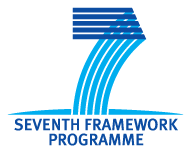

WAI-ACT Project (IST 287725)
Introduction
Web Accessibility Initiative - Cooperation Framework for Guidance on Advanced Technologies, Evaluation Methodologies, and Research Agenda Setting to Support eAccessibility (WAI-ACT)
European Commission Project, 7th Framework Programme, IST 287725
Page Contents
Project Work
WAI-ACT project deliverables were carried out through WAI groups and processes:
- EOWG - Education and Outreach Working Group
- Application Notes on Common Accessible Web Components
- Application Notes and Code Samples for Advanced Technologies
- Practical Guidance on Adopting and Implementing W3C/WAI Standards
- Guidance on Finding and Selecting Web Accessibility Evaluation Tools
- Interactive Guide to Assist Managing Web Accessibility Evaluations
- ERT WG - Web Content Accessibility Guidelines Working Group
- Eval TF - WCAG 2.0 Evaluation Methodology Task Force
- RDWG - Research and Development Working Group
- WAI Staff Effort
How To Participate
WAI-ACT Project formally ended on 1 September 2014. The project work listed above contributed valuable W3C/WAI resources. To help maintain, evolve, and contribute to these and other resources, see Getting Involved with WAI and Participating in WAI. If you have any questions, contact Shadi Abou-Zahra (Scientific Coordinator).
WAI-ACT work was developed through W3C/WAI Working Groups. Project work is listed under the Working Group or Task Force above. The work was open for direct contribution by anyone. This includes reviewing drafts of these resources and actively participating in the relevant Working Groups to help develop these resources.
About WAI-ACT
WAI-ACT was a support action project, co-funded by the European Commission as a Specific Support Action under the IST 7th Framework Programme. The project started on 1 September 2011 for a duration of three years. It was lead by and built upon the strengths of the existing World Wide Web Consortium (W3C) Web Accessibility Initiative (WAI) cooperation mechanisms, to facilitate strategic European and international participation throughout the project. WAI-ACT project partners were:
- W3C Web Accessibility Initiative (W3C/WAI)
- Stiching Bartimeus Accessibility (SBA)

- Fraunhofer Institute for Applied Information Technology (Fraunhofer)

- Johannes Keppler University (JKU)

WAI-ACT work was developed in an open, non-exclusive collaborative environment to maximize participation and involvement from stakeholders. WAI-ACT also seeked active exchange with relevant networks in Europe such as eAccess+ ![]() , and coordination standardisation activities such as EC Mandate M/376
, and coordination standardisation activities such as EC Mandate M/376 ![]() .
.
More specifically...
WAI-ACT, a Cooperation Framework for Guidance on Advanced Technologies, Evaluation Methodologies, and Research Agenda Setting to Support eAccessibility, addressed critical areas of advanced accessibility support through activities that built upon the strengths of past web accessibility work, harmonizes existing work, and helped shape a research agenda in coordination with key stakeholders in Europe and internationally.
The project addressed the need for expanded European and international cooperation on the development of accessibility solutions for people with disabilities; for consensus-based, authoritative technical guidance to accelerate implementation of advanced technologies; for internationally harmonised evaluation methodologies; and for a coordinated research agenda on eAccessibility.
WAI-ACT addressed these challenges through development of a framework for open, expanded cooperation among European and international stakeholders, technical guidance on advanced web technologies; an evaluation methodology for web accessibility; and a research agenda for eAccessibility. Technical guidance includes a repository of information on accessibility support in web technologies, application notes on authoring accessible web page components, and code samples for web applications. WAI-ACT contributed to:
- Expanded cooperation on the development of accessibility solutions
- Authoritative accessibility guidance on advanced web technologies
- Harmonized methodologies for evaluating accessibility of websites
- Common visions for a coordinated eAccessibility research agenda
See project deliverables and contact Shadi Abou-Zahra (Scientific Coordinator) for more information.
Project Staff
WAI-ACT project staff include the following people:
- W3C Web Accessibility Initiative (W3C/WAI)
- Shadi Abou-Zahra (Scientific Coordinator)
- Jessica Michel (Administrative Coordinator)
- Bim Egan
- Eric Eggert
- Kevin White
- Pascale Payrol
- Tom Williamson
- Vivien Lacourba
- Stiching Bartimeus Accessibility (SBA)

- Eric Velleman
- Wilco Fiers
- Martijn Houtepen
- FIT Web Compliance Center (Fraunhofer)

- Carlos Velasco
- Evangelos Vlachogiannis
- Yehya Mohamad
- Philip Ackermann
- Johannes Keppler University (JKU)

- Klaus Miesenberger
- Daniel Pöll
- Andrea Petz

 Translations
Translations